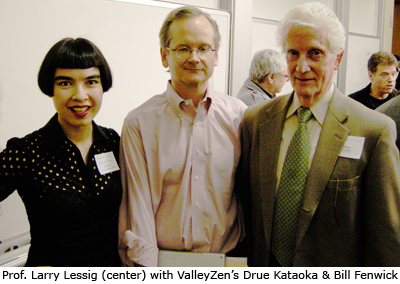Everybody Should Run for President. At the Same Time.

Yesterday we attended the Legal Futures Conference at Stanford University. A fiery debate erupted between Prof. Larry Lessig and Andrew Keen about Professional vs. User-Generated Content (UGC). Lessig believes that UGC is the future and that legal changes should be made to facilitate its growth. Open the floodgates and see if old media can compete! Keen argues that UGC produces massive amounts of low-quality content whose credibility can’t be relied on, and it clutters the public domain. Keen is nostalgic for an old media past with “greater cultural democracy” and Professionals at the controls. User-generated content will make all content a commodity with no buyers willing to pay a livable wage.
A User-Generated President
What do we think about that? We think that everybody should run for president—at the same time. May the best man or woman win! UGC is a great idea. Many of the professional content creators (artists, musicians, actors, writers) have been arrogantly sticking to their position as the “professional content creators”—as if this is a trademark or patent that they hold.
UGC like Youtube videos, blog posts, and Flickr images suddenly put the establishment in a competitive situation where they have to prove their value– which is a good thing. A system where everybody runs for President is excellent—when you can make it work.
UGC is huge and it’s not going away. Nobody can fight—or should fight—the moving train. There are millions of videos and blogs on the web. The problem is that there is no system that efficiently and quickly makes the best content rise to the top. Youtube, Digg, Truemors, etc. allow voting/rating to play a big role in ranking the best content. However, this system is inert—to be voted to the top, you need to have a big audience to begin with. This leaves it open to manipulation.
Toilet-flushing Cat vs. Shostakovich
The other problem with UGC nowadays is the problem of the “lowest common denominator.” Still in their infancy, UGC aggregators like YouTube, Flickr, etc. rank their content based on a lowest common denominator system: the cat flushing the toilet (4,034,487 views) will always win over Shostakovich playing his own concerto (119 Views). Flickr and YouTube currently compete for the most part with the tabloids, not the Wall Street Journal—though eventually they will. Individual blogs, for example, have emerged that represent a more elite perspective and have influencers as their audience, not the gross-out crowd. One way of dealing with this problem of integrating important voices vs. less important ones is the link popularity system such as Google’s PageRank. However, the problem with it is that quantity (of low quality links) usually trumps quality. So for now even in Google the cat flushing the toilet rises to the top. Eventually these problems will be resolved.
Despite these challenges, UGC is a positive development for the world of content generation. But Pandora’s box has been opened, and the current evaluation systems are overwhelmed: there is too much content to evaluate so voting the best content to the top fails.
It would be like everybody in the US running for President at the same time, against each other. Undoubtedly soon a new system for the evaluation of content will develop that will take care of the voting problem. And whoever discovers this system will make billions of dollars.
What will be the end result of this? Professional content creators are under intense pressure to compete against UGC which is a good thing. We are already seeing how it creates sharper, more biting journalism on CNN. Eventually, the worst professional content creators will lose their jobs and the best amateur content creators will go pro—economics at its best.
The need for content creation institutions such as newspapers, record producers, and galleries will not go away soon because they remain the best way for separating high from low quality content. At least, until UGC aggregators fix all of their problems—which may take years.
Someday everybody will run for President—and may the best person win. Maybe sooner than we think.
- Coming up on ValleyZen:
- Another Legal Futures Conference Post from Bill
- Tim Draper’s Episode 4 Video Interview tomorrow

Bill Fenwick & Drue Kataoka
With Contributions from Svetlozar Kazanjiev



Interesting blog post.
I guess the best comparison you can make is that UGC is like democracy. 95% of the times it works, but that doesn´t mean that the outcome is a good one.
I don´t think professionals will se UGC as a competition, because when the 1% of the UGC is recognized as quality content that 1% will cross the border and become professional content. I do believe thought that there will be more competition in the professional area, and that a dumb title from a dumb or a smart university won´t be enough anymore.
In the end even if we all had the possibility hardly believe that we would all want to run for president
Best Regards from Mexico